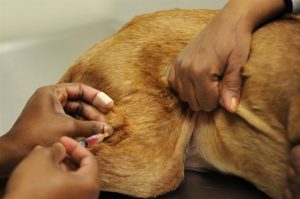
Parenting a puppy can be as fun as it sounds. Shopping for puppy friendly products can be a blast and you’ll be thrown out with choices. Being a responsible one is tricky, here is a list to make you do so.

Your puppy needs a comfortable leash and collar, preferably nylon or leather. Make sure the collar is loose enough to fit in two fingers between the neck and collar. Adjust it as the puppy grows.

Buy a puppy bed which is comfortable enough to stretch, machine washable, totally non-allergenic and relatively resistant to chewing. Buy two so that you could use one while the other is for washing and drying.
An identification tag is not just for fancy, it must contain your puppy’s name, your name, and your contact information. This will help you tons in case if your dog gets lost and other adversaries.

Treat the crate as your puppy’s safe place in the world. So make sure it is comfortable and big enough for your dog to sit, stand and comfortably lay down.

Your puppy will need it as soon as they get home. A stainless steel bowl is the best choice, they are easy to easy to sanitize, clean and strong.

They are many types: chew toys, plush toys, fetching toys and rope and tug toys. Despite this vast choices, make sure you choose durable and good quality toys that suit the size of your dog.
Potty training your puppy can be hard but remember they are kids. Pee pads are smeared with an attractant that boosts them to eliminate on them and they are easy to clean than a newspaper. Give a lot of complicates to your puppy when they do so.

Puppies don’t need grooming as much as adults. Use soft rubber brush to get them used to groom. Also, get a nonallergic pet shampoo, nail clipper, towels, toothbrush and dog toothpaste.

A pup will require more food and calorie intake to build healthy bones, organs, skin, and coat. Talk to your veterinarian about the “growth and development” diet that your pet needs to follow.

From 6 weeks, your pup needs vaccines for rabies and bordetella, also known as a kennel cough to prevent any life-threatening diseases. Talk to your vet and determine the appropriate vaccination schedule for your puppy.
Regularly veterinarian, breeder or knowledgeable pet store associate to know more about how to raise your puppy and monitor their health.